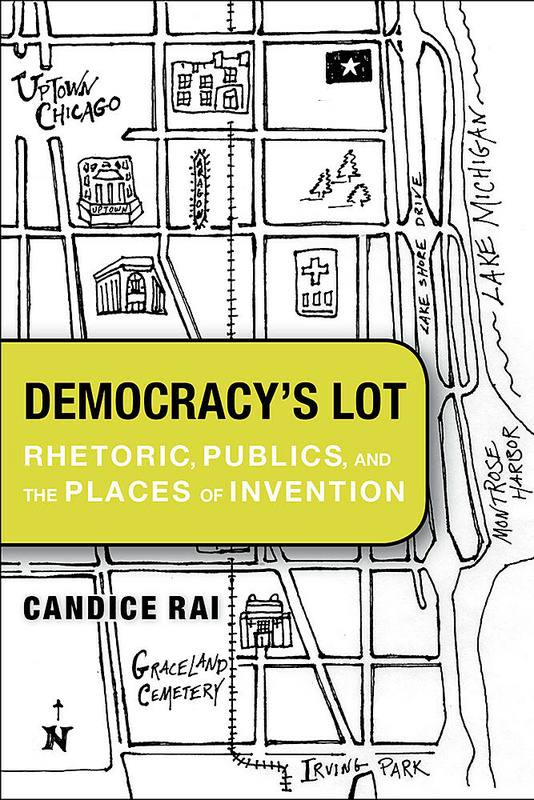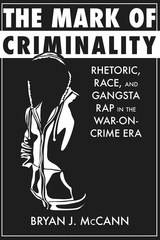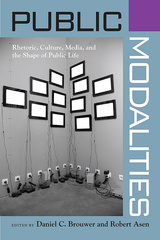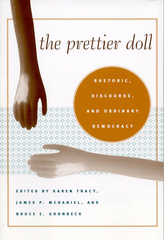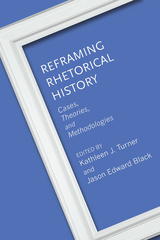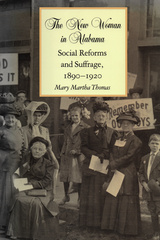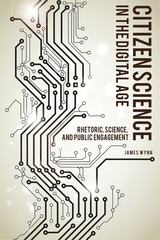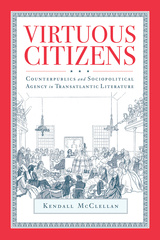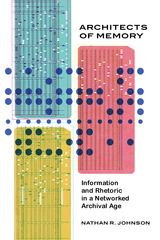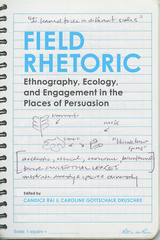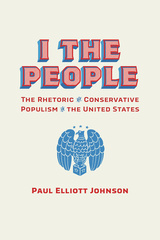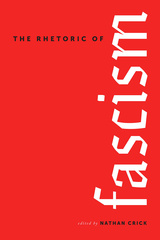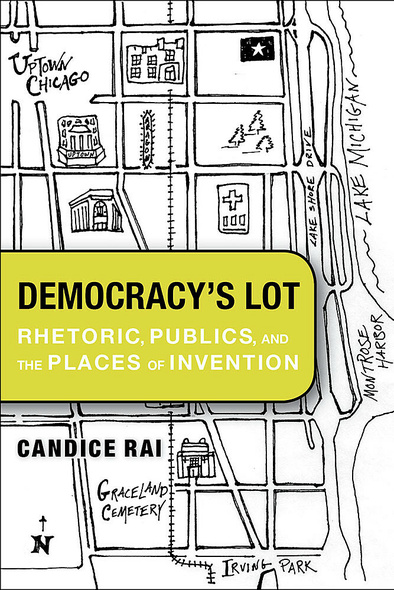
264 pages, 6 x 9
17 B&W illustrations, including 1 map - 6 tabl
Hardcover
Release Date:15 Apr 2016
ISBN:9780817319007
Democracy's Lot
Rhetoric, Publics, and the Places of Invention
By Candice Rai
University of Alabama Press
Traces the communication strategies of various constituencies in a Chicago neighborhood, offering insights into the challenges that beset diverse urban populations and demonstrating persuasively rhetoric’s power to illuminate and resolve charged conflicts
Candice Rai’s Democracy’s Lot is an incisive exploration of the limitations and possibilities of democratic discourse for resolving conflicts in urban communities. Rai roots her study of democratic politics and publics in a range of urban case studies focused on public art, community policing, and urban development. These studies examine the issues that erupted within an ethnically and economically diverse Chicago neighborhood over conflicting visions for a vacant lot called Wilson Yard. Tracing how residents with disparate agendas organized factions and deployed language, symbols, and other rhetorical devices in the struggle over Wilson Yard’s redevelopment and other contested public spaces, Rai demonstrates that rhetoric is not solely a tool of elite communicators, but rather a framework for understanding the agile communication strategies that are improvised in the rough-and-tumble work of democratic life.
Wilson Yard, a lot eight blocks north of Wrigley Field in Chicago’s gentrifying Uptown neighborhood, is a diverse enclave of residents enlivened by recent immigrants from Guatemala, Mexico, Vietnam, Ethiopia, and elsewhere. The neighborhood’s North Broadway Street witnesses a daily multilingual hubbub of people from a wide spectrum of income levels, religions, sexual identifications, and interest groups. When a fire left the lot vacant, this divided community projected on Wilson Yard disparate and conflicting aspirations, the resolution of which not only determined the fate of this particular urban space, but also revealed the lot of democracy itself as a process of complex problem-solving. Rai’s detailed study of one block in an iconic American city brings into vivid focus the remarkable challenges that beset democratic urban populations anywhere on the globe—and how rhetoric supplies a framework to understand and resolve those challenges.
Based on exhaustive field work, Rai uses rhetorical ethnography to study competing publics, citizenship, and rhetoric in action, exploring “rhetorical invention,” the discovery or development by individuals of the resources or methods of engaging with and persuading others. She builds a case for democratic processes and behaviors based not on reflexive idealism but rather on the hard work and practice of democracy, which must address apathy, passion, conflict, and ambivalence.
Candice Rai’s Democracy’s Lot is an incisive exploration of the limitations and possibilities of democratic discourse for resolving conflicts in urban communities. Rai roots her study of democratic politics and publics in a range of urban case studies focused on public art, community policing, and urban development. These studies examine the issues that erupted within an ethnically and economically diverse Chicago neighborhood over conflicting visions for a vacant lot called Wilson Yard. Tracing how residents with disparate agendas organized factions and deployed language, symbols, and other rhetorical devices in the struggle over Wilson Yard’s redevelopment and other contested public spaces, Rai demonstrates that rhetoric is not solely a tool of elite communicators, but rather a framework for understanding the agile communication strategies that are improvised in the rough-and-tumble work of democratic life.
Wilson Yard, a lot eight blocks north of Wrigley Field in Chicago’s gentrifying Uptown neighborhood, is a diverse enclave of residents enlivened by recent immigrants from Guatemala, Mexico, Vietnam, Ethiopia, and elsewhere. The neighborhood’s North Broadway Street witnesses a daily multilingual hubbub of people from a wide spectrum of income levels, religions, sexual identifications, and interest groups. When a fire left the lot vacant, this divided community projected on Wilson Yard disparate and conflicting aspirations, the resolution of which not only determined the fate of this particular urban space, but also revealed the lot of democracy itself as a process of complex problem-solving. Rai’s detailed study of one block in an iconic American city brings into vivid focus the remarkable challenges that beset democratic urban populations anywhere on the globe—and how rhetoric supplies a framework to understand and resolve those challenges.
Based on exhaustive field work, Rai uses rhetorical ethnography to study competing publics, citizenship, and rhetoric in action, exploring “rhetorical invention,” the discovery or development by individuals of the resources or methods of engaging with and persuading others. She builds a case for democratic processes and behaviors based not on reflexive idealism but rather on the hard work and practice of democracy, which must address apathy, passion, conflict, and ambivalence.
Rai demonstrates the value of fieldwork in rhetoric and, in doing so, strengthens rhetorical scholarship and praxis. This book makes an important contribution because it offers one of few long-term ethnographic studies grrounded in diverse approaches to rhetoric and focuses on topoi, like housing, diversity, and democracy, to transform understandings of such commonplaces.'
—Rhetoric and Public Affairs
'Rai unravels how democracy is continuously achieved and dissipated in the confluences of rhetorical performances, community activisms and, as to be reasonably expected, the history, culture, and economy of specific citizen groups as they strive in situ for what they believe democratic rule ought to be. Taking as its starting point the case of Wilson Yard, a conflict-ridden site in an ethnically and economically diverse Chicago neighborhood, the book tracks the multiple lines of forces that jointly put democracy in action in an urban American context. Blending rhetorical analyses, ethnographic description, and keen sociopolitical observations, Democracy’s Lot will be of interest to anyone who not only cherishes democratic values but wishes to know how these values can be realized in the concrete struggles for justice in our lives. Summing Up: Recommended.'
—CHOICE
‘Democracy’s Lot is one of the most interesting, original, and important studies I have read in a long time. Not only a fascinating story about gentrification and resistance in the contemporary North American city, it’s also a model of original sociological research, using a methodology the author calls ‘rhetorical ethnography,’ which combines the deep, sustained, social immersion of ethnography with the detailed, critical discourse analysis of rhetoric. Above all, Rai makes a timely, ground-breaking intervention into the study of contemporary democracy, putting the lie to both uncritical celebrations of free and open public spheres and radical critiques of democracy in the era of neoliberalism.’
—David Fleming, author of City of Rhetoric: Revitalizing the Public Sphere in Metropolitan America
Candice Rai presents an innovative methodological framework that employs textual analysis and fieldwork to study the interactions of housing debates, street protests, public art, visceral bodily responses, and new media technologies. Fieldwork presents an exciting opportunity to expand the field of inquiry for rhetorical scholarship that typically lies outside of our reach. However, Rai adds to and extends this line of inquiry by drawing explicit connections between text-centered rhetorical themes and concepts (like topoi) and the field as a place of rhetorical practice.’
—Robert Asen, coeditor of Public Modalities: Rhetoric, Culture, Media, and the Shape of Public Life
Candice Rai is an assistant professor of English at the University of Washington.

